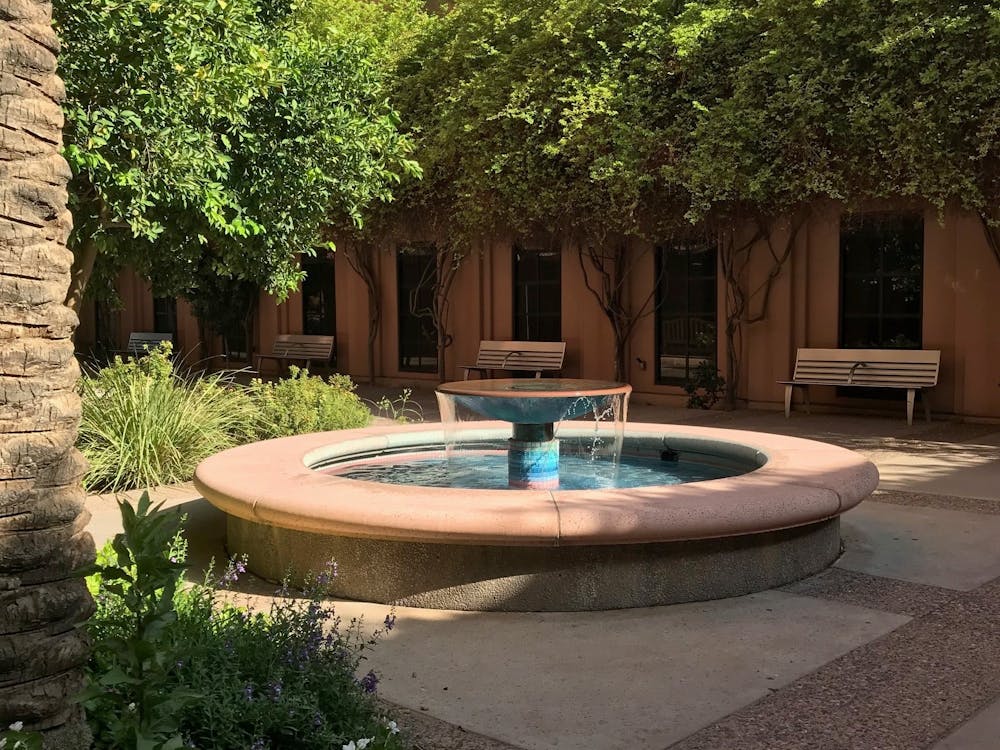Every Wednesday evening, students gather at the School of Music to begin their weekly "soundwalks," where they roam the Tempe campus and listen to the sounds of nature around them as a way to reflect and get in touch with their inner-self.
The students use the walks, which are hosted by the Acoustic Ecology Lab and last between 20-30 minutes, as a way to document climate change through sound and notice of the constantly changing environment around them.
The soundwalks are designed as a simple and relaxing way for ASU students and others to engage with the sounds of the environment.
The lab itself was founded in 2015 by School of Music professor Sabine Feisst and School of Arts, Media and Engineering associate professor Garth Paine.
“Dr. Feisst suggested we need to have a way to get more ASU students involved and spread the knowledge of listening,” said junior music major Hunter Langenhorst. “Her goal is to reach as many people as possible.”
The events are designed to allow people to develop a relationship between themselves and the sounds of nature around them, Lagenhorst said.
The walks typically begin at the School of Music courtyard, where the students hosting the walk give a brief explanation for those attending on what to listen for, said Ph.D. musicology student Anne-Marie Shaver, who is one of the guides.
From there, the quiet walk begins with participants being asked to remain silent and focused on the sounds of the environment as they go.
The student guides lead the group throughout the walk until they return to the courtyard fountain. Then, they discuss their observations of what they heard and their experiences with them.
The latest walk on Oct. 30 was different than others as it was a “spooky” themed walk for Halloween. For this walk, graduate music students Adam Heyen and Derek Drudge led the event.
“It’s pretty common knowledge that we are very visually centered in our lives, but sounds affect us and our emotions,” Heyen said. “They affect our emotions and how we feel in certain spaces … whether things seem normal or really strange to us. That phenomenon is called non-linear sounds.”
Rather than experience the sounds of nature, the team led by Heyen and Drudge took participants to the School of Music's basement. While there, the lights were turned off. Drudge began playing what he calls a “harmonic recorder."
Heyen began making strange noises with the mouthpiece of his instrument, and Langenhorst played the piano.
All of this was done is an unorthodox manner to fit the theme of Halloween.
Though this walk was different than others, it still provided insight on the experience of listening and how it affects people.
The soundwalks are just a small part of what the Acoustic Ecology Lab does.
The Acoustic Ecology Lab's work involves studying the sounds of nature and keeping track of them through documentation as environments change, Paine said.
By using VR technology, they can bring these sounds and experiences beyond the national parks and areas of nature, where these studies are typically done, to the homes and spaces of others.
The students who take part in these soundwalks and other parts of the lab were drawn to it because of its uniqueness and their collective interests in the sounds of nature through music, said Langenhorst.
“In the context of our climate crisis, listening is a way to make ourselves aware and make the statement we are turning our attention to that problem,” he said.
The sounds aren’t just sounds. They can serve as documentation of a changing environment, and as symbols and references that mean something different to each listener, Drudge said.
“It's a form of protest, it’s a change in the dynamic. It's something easy to show other people … it’s a really interesting way to spread ideas about community and sound," he said.
Correction: A previous version of this story misspelled Paine's name on second reference. The story has been updated to correct the error.
Reach the reporter at wmyskow@asu.edu and follow @wmyskow on Twitter.
Like The State Press on Facebook and follow @statepress on Twitter.

Wyatt Myskow is the project manager at The State Press, where he oversees enterprise stories for the publication. He also works at The Arizona Republic, where he covers the cities of Peoria and Surprise.




